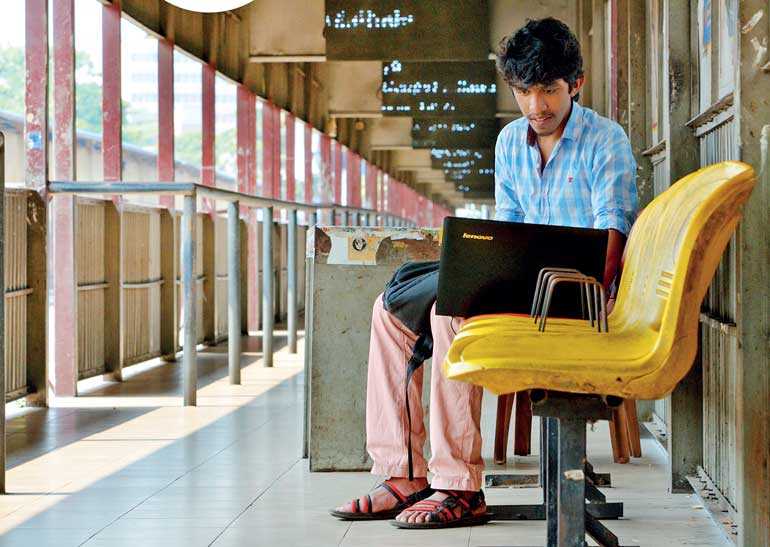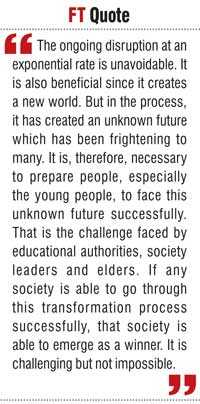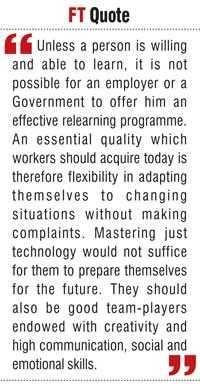Sunday Feb 22, 2026
Sunday Feb 22, 2026
Monday, 16 July 2018 00:00 - - {{hitsCtrl.values.hits}}

A new definition of the poor
The poor are usually defined as those who are below a given level of income that would be insufficient to meet their basic needs. In my view, the poor – no matter whether it is an individual, family or a nation – are those who are unable to read the oncoming information logically, assess the risks posed or opportunities offered to them and take measures to minimise risks or augment prospects. In this sense, we all are poor.

The list is inclusive, covering all those in the Government, businesses, professions, and politics and so on. This is because economic disruptions are taking place all the time and we fail to even notice them. Once the disruption has hit us on the head, we cry out for relief or blame the Government for not rescuing us. The underlying reasoning for blaming the Government is that it has competency to do so but does not do it.
But the Government as a collective body is even weaker than we are in assessing risks and harnessing opportunities. This is because those in the Government – politicians and bureaucrats – are good at assessing only the opportunities personally available to them and would do everything to exploit those opportunities. We, the citizenry, are not their concern. As for risks, they do not care about them since they can pass the burden of risks on to us. Hence, it is our job to manage risks and exploit opportunities.
Creative destructions help societies to progress
In 1850, the French economist and statesman, Frederic Bastiat, elucidated the unseen opportunities present in an observed disruption in his now famous parable of a broken window. What he said was that accidental breaking of a window is a disaster. But it triggers a series of actions that will replace not only the broken window, but also cause the development of new window technology bringing new income to window makers and jobs to people.
In 1942, the Austrian-American economist Joseph Schumpeter formally presented this idea as ‘creative destruction’. Economic history is replete with many examples of such creative destructions. But, we did not notice them because they took place at a slow pace a way apart from each other. However, today, they happen at an exponential rate forcing us to abandon comfortable living, complacence and linear thinking, as highlighted by Peter H Diamandis and Steven Kotler in their 2015 book ‘Bold: How to Go Big, Create Wealth and Impact the World’. Accordingly, new things replace old things pretty quickly; even those new things become obsolete before some of the people in the world could get adjusted to them.
Hence, the modern world characterised by the fourth phase of industrial revolution is full of appointments and disappointments. Those who are able to get adjusted will win and those who fail have to cry foul. That is the nature of poverty that we are all experiencing today.
Sri Lanka’s tea sector failed to assess the risks
Take for example Sri Lanka’s tea sector. Sri Lankans are proud of the brand name ‘Ceylon Tea’ and think that it would do wonders for it to keep afloat in the hostile competition it faces from rival producers as well as rival products. On both counts, Sri Lanka’s tea sector has failed to logically read the oncoming information and take measures to protect itself.
When the rival producers in East Africa commenced using fertile virgin lands in early 1960s to cultivate tea and produce straightaway CTC tea which is demanded by consumers in rich Western countries, the country’s tea sector continued to produce orthodox black tea and supply the same to Pakistan, Middle East and the old Soviet Union where import of tea is determined by political decisions and not by the free market. Hence, the tea sector had to rely on the relationships which Sri Lanka Government had with the Governments of those countries and that complacence was a risk.
With regard to rival products, it did not foresee the risks coming from the soft drink manufacturers who started a fierce competition with traditional beverage manufacturers for market dominance. For instance, in 1986, addressing a convention of sales representatives, the Chairman and CEO of the Coca Cola Company, Roberto Goizueta, made a historic speech (available at: https://www.youtube.com/watch?v=tpF_-BbaV1g ). He said: “Right now at this point in time in the United States, people consume more soft drinks than any other liquid, including ordinary tap-water. We’ll take full advantage of our opportunities. Someday, not too many years into our second century, we’ll see the same wave catching on markets after markets on to eventually the number one beverage on earth will not be ‘coffee or tea or wine or beer’. It will be soft drinks – our soft drink.”
So, the Coca Cola Company took note of the declining consumer tastes for traditional liquids which was naturally happening and reoriented its strategic vision to cut a notch for itself in the new opportunity set that was offering to it in the market. This is a disruptive statement and any competitor would have taken it seriously.
Unintended disruptive statements too help
There are many such disruptive statements made innocently or jokingly by people but later actually disrupted the whole production mechanism of the world.

One such well-known disruptive statement is the pronouncement by the late Sir Arthur C Clarke in 1945 in an article in the magazine Wireless World that it would be possible for the world to beam radio signals covering the entire globe from a satellite placed in the orbit (available at: https://www.wired.com/2011/05/0525arthur-c-clarke-proposes-geostationary-satellites/ ). At that time, nobody took notice of this. But, decades later, in early 1970s, the world was able to realise Clarke’s pipe dream by shooting communication satellites to the orbit of the earth. It made communications really wireless and did away with the need for copper cables to transmit voice or data from place to place. The victims were all those countries that were depending on producing copper as a raw material.
Another is a prank played by Sir Richard Branson in an interview with Music Week in 1986 that he had secretly invented a Music Box that could store in a tiny deice any song a person wishes to listen to. Years later, Steve Jobs had told Branson that his Music Week article inspired him to invent both iPod and iTunes (available at: https://www.entrepreneur.com/article/245028). The result was the complete displacement of the long-playing record manufacturing industry and also mini-tape recorders like Sony Walkman. It was an instance of processing information and exploiting the opportunity available.
A new world through disruptions
Thus, the ongoing disruption at an exponential rate is unavoidable. It is also beneficial since it creates a new world. But in the process, it has created an unknown future which has been frightening to many. It is, therefore, necessary to prepare people, especially the young people, to face this unknown future successfully. That is the challenge faced by educational authorities, society leaders and elders. If any society is able to go through this transformation process successfully, that society is able to emerge as a winner. It is challenging but not impossible.
Cyberspace natives should become global tech citizens
An important change which technological advancements have made is that technology, once developed, becomes global providing its fruits to everyone. For instance, if a successful cancer treatment method is discovered tomorrow, its benefits will be enjoyed by everyone in the global. What it means is that people have to think and act global rather than native. It therefore necessitates transforming the present ‘cyberspace natives’ into ‘global tech citizens’. In other words, disruptive technologies will really become disruptive if people continue to think and act nationally.
Creating thinking schools and promoting a learning nation
Singapore appreciated this challenge in its early development process. A World Bank publication in 2008 under the title ‘Toward a Better Future: Education and Training for Economic Development in Singapore since 1965’ has noted that in 1997, the city state adopted the vision of converting traditional schools to ‘Thinking Schools’ and complacent society to a ‘Learning Nation’. The objective was to gear the education system to nurture an innovative society so that they could meet the demands of a world in the 21st century.
From Singapore Incorporated to Singapore International Incorporated
It also planned to provide the Singaporean citizens by 2020 the high living standard enjoyed by Swiss citizens in mid-1990s. For that, it was necessary to change from ‘Singapore Incorporated’ to ‘Singapore International Incorporated’. In other words, it successfully converted its cyberspace natives to global tech citizens, a must for them to meet the challenges of an unknown future created by disruptive technologies. It enabled Singapore to jump onto the bandwagon of disruptive technologies and be a driver rather a feared victim.
Sri Lanka’s inward-looking cyberspace natives
But, Sri Lanka’s position is completely different. Its society is not yet ready to appreciate the fast changing global outlook. Instead of trying to become global tech citizens, its citizenry is planning to walk into a shell and hide itself in its protective cover by proclaiming and nurturing nationalistic sentiments. This is typical in the case of professionals, including medical and IT professionals. Their slogan is ‘think local, act local’ believing in the supremacy of their knowledge base. They are mainly guided by an ego that prevents them from learning from others, collaborating with others and working with others. It is a sure sign of not being able to face the challenges of disruptive technologies. Instead of being drivers of technology, Sri Lankans will emerge as victims, crying foul about developments over which they have no control.
Automation to take over human’s jobs

The biggest threat of disruptive technologies is directed to routine jobs which can be automated. A report prepared by McKinsey Global Institute in December 2017 (available at: https://www.mckinsey.com/~/media/mckinsey/featured%20insights/future%20of%20organizations/what%20the%20future%20of%20work%20will%20mean%20for%20jobs%20skills%20and%20wages/mgi%20jobs%20lost-jobs%20gained_report_december%202017.ashx) has predicted that automation would by 2030 take over about 30% of routine jobs displacing about 800 million workers world throughout.
In two scenarios marking average automation and rapid automation, the three biggest losers of routine jobs between 2016 and 2030 are as follows: China between 118 to 236 million, India between 60 to 120 million and USA between 39 to 73 million.
When routine jobs are lost worldwide, it affects countries like Sri Lanka too. In the first place, Sri Lanka will lose markets for its labour intensive manufactured products in rich countries because those products are now manufactured locally in automated factories. Second, Sri Lanka will not be able to send its unskilled labour for employment in foreign countries since such labour will lose demand. On both counts, Sri Lanka will lose.
Hence, what should be done is, as McKinsey Global Institute Report has recommended, facilities should be provided for displaced workers to acquire new skills and make them useful in an automated economy. This requires Governments, businesses and individuals to work together to ensure a smooth transmission of the displaced workers new jobs created in respective economies.
Workers should go back to school
It is therefore incumbent on all workers to go back to school and relearn skills. Since learning is a lifelong enterprise, re-skilling workers should be done continuously. This is specifically challenging in the present context since skills mastered by a worker today will pretty soon become obsolete due to rapid changes in technology.
Unless a person is willing and able to learn, it is not possible for an employer or a Government to offer him an effective relearning programme. An essential quality which workers should acquire today is therefore flexibility in adapting themselves to changing situations without making complaints. Mastering just technology would not suffice for them to prepare themselves for the future. They should also be good team-players endowed with creativity and high communication, social and emotional skills.
This is a formidable challenge which Sri Lankan schools and higher learning institutions would face since they are mostly rooted in old systems and practices when imparting knowledge. Even then, they mostly confine themselves to providing only book knowledge to learners.
Businesses should re-skill their workers
Businesses which find labour costs ballooning will certainly go for automation and use of artificial intelligence. But it would create surplus labour within the organisation needing either re-deployment or relearning or both. This is an additional cost and a firm may be reluctant to incur that cost on its own.
Hence, from the point of view of the long-term sustainability of the economy, re-skilling workers is a public good to be supplied by the Government on a priority basis. In Singapore where such a system prevails, about 120000 workers have already completed Government-sponsored retraining programmes.
The goal of the Government should be to make it inclusive so that all are re-skilled to face the demanding challenges posed by automation. Governments which are not ready to accept this new role will fall victim to disruptive technologies. Sri Lanka is one such country and it has to learn a lot from other nations.
(W A Wijewardena, a former Deputy Governor of the Central Bank of Sri Lanka, can be reached at [email protected])